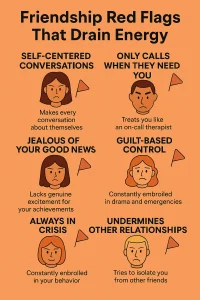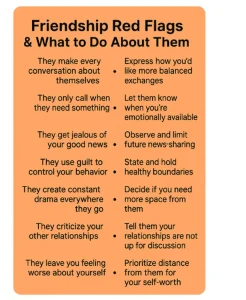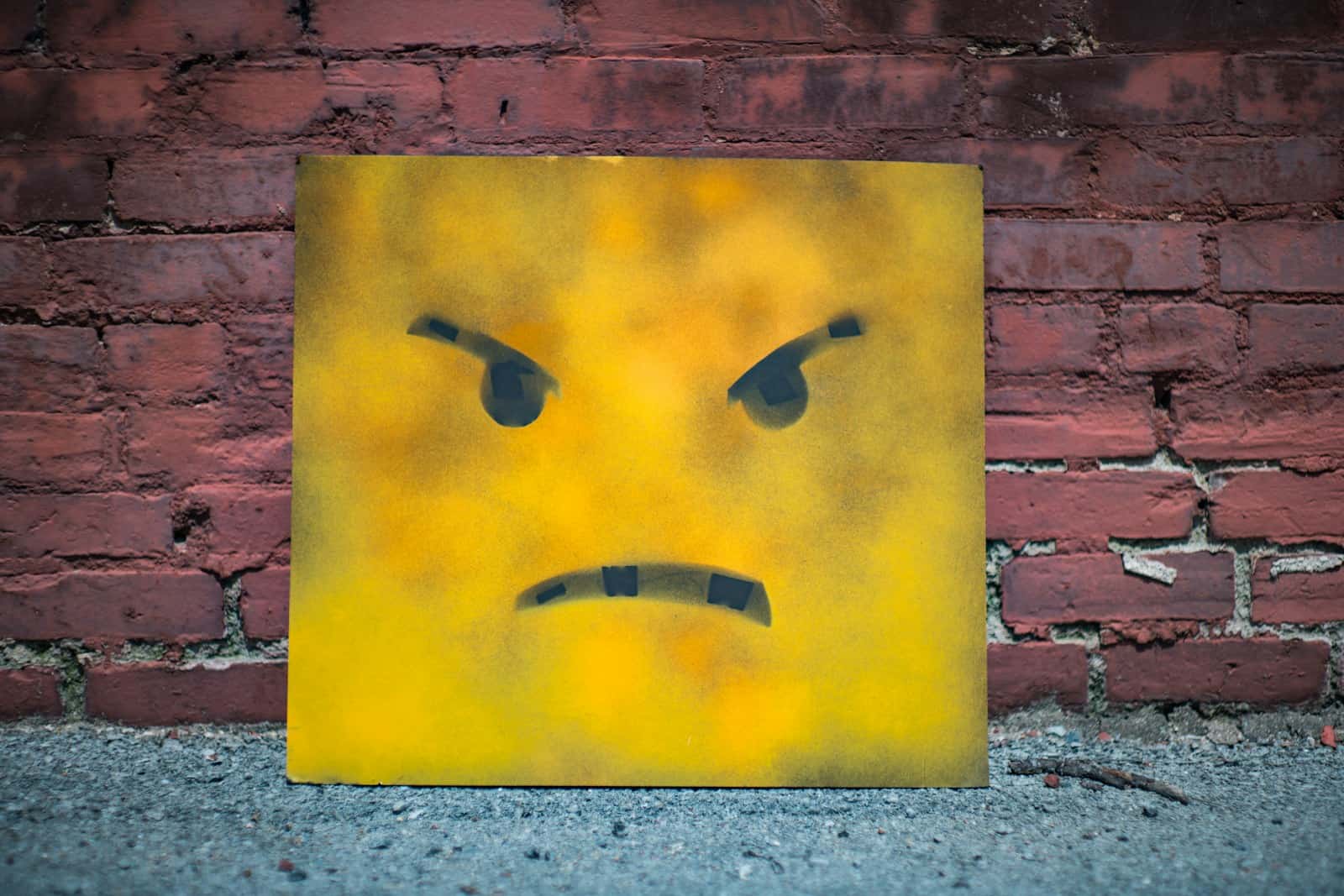7 Friendship Red Flags That Drain Your Energy (Most People Miss #5)
 7 Friendship Red Flags That Drain Your Energy (Most People Miss #5)
7 Friendship Red Flags That Drain Your Energy (Most People Miss #5)
You used to love hanging out with friends. Now you need three days to recover from a two-hour coffee date.
Sound familiar? A friend calls you crying at 11 PM yesterday. Her boyfriend had upset her again like always. She needed to talk about it right now.
So you listen for two hours straight without breaks. You gave advice and offered support, I mean that’s what friends do, right? When you finally hung up, you felt totally drained. Then you realize something that makes your stomach drop. This was the fourth time this month. And in all those conversations, she never once asked how you were doing.
If you’ve ever felt exhausted after spending time with a friend you care about. If you’ve noticed you’re always the one listening but never being heard in return. If you wonder whether it’s normal to dread seeing someone you’re supposed to enjoy. This is for you.
Some friendships take more energy than they give back. These aren’t necessarily bad people, they just have patterns that can slowly wear you down until you feel empty instead of fulfilled.
Learning to spot these friendship red flags early can save your energy. For friends who actually add value to your life instead of draining it.
Why Some Friendships Feel Like Work
 Healthy friendships should energize you, not drain you, right? But some people have learned to get their needs met in ways that exhaust others.
Healthy friendships should energize you, not drain you, right? But some people have learned to get their needs met in ways that exhaust others.
Maybe they never learned how to process emotions alone. Maybe they’re used to being the center of attention always. Maybe they don’t realize how much they’re taking from you without giving back.
The reasons matter less than the impact on you. If you consistently feel tired, stressed, or empty after spending time with someone, then that’s valuable information about the relationship and how it affects your wellbeing, and it’s time for action.
Your energy is limited and precious. You deserve friends who give as much as they take. Friends who celebrate your wins as much as you celebrate theirs.
Some people drain others without meaning to. Understanding their patterns can help you protect yourself while still caring about them.
7 Major Friendship Red Flags to Watch For
These patterns might seem harmless at first glance. But when they happen consistently over time, they create relationships that drain you.
- They Make Every Conversation About Themselves
 You share exciting news, and they immediately jump in with their own story. A story that completely overshadows yours. You mention a problem, and suddenly you’re hearing about their bigger problem. A problem that needs immediate attention.
You share exciting news, and they immediately jump in with their own story. A story that completely overshadows yours. You mention a problem, and suddenly you’re hearing about their bigger problem. A problem that needs immediate attention.
They’re not really listening to you at all. They’re just waiting for their turn to talk about themselves. Even when they ask “How are you?” they don’t wait for a real answer.
Over time, what happens is you stop sharing important things with them. Because you know the conversation will just get redirected to their issues anyway.
This ranks as one of the most common friendship red flags. But people often miss it because it seems normal in our culture.
Warning sign: You feel unheard and unimportant in your own conversations with them regularly.
- They Only Contact You When They Need Something
Your phone lights up with their name calling you. And your first thought is “Oh What do they want now?” instead of excitement about hearing from them.
They reach out when they’re upset and need advice, when they some drama going on. When they want to complain about work or relationship problems. When they need a favor or emotional support right away. But when things are going well in their life, you don’t hear from them.
You realize you’re more like an emotional support hotline than a friend.
This pattern represents one of the clearest friendship red flags that shows the relationship is unbalanced. The relationship is completely one-sided and serves only their needs.
Warning sign: You can predict what mood they’re in based on whether they’re texting you.
- They Get Jealous of Your Good News
When something wonderful happens to you in life, their response feels flat or forced. They might say “That’s great” but their tone suggests they don’t really mean it.
Or they immediately follow up with something dismissive that makes your achievement feel smaller. “That is so easy to do right now” or “I’ve been thinking about doing something like that too.”
Sometimes they just change the subject quickly without any comment. Or they find a reason to share their own recent success.
What ends up happening, slowly, is that you start hesitating to share good news with them. Because you know it won’t be received with genuine excitement or celebration for you.
These friendship red flags show up when people can’t handle others’ success or happiness genuinely.
Warning sign: You feel like you need to downplay your achievements around them to avoid problems.
- They Use Guilt to Control Your Behavior
“You never have time for me anymore, do you?” “I guess our friendship isn’t that important to you anymore.” “After everything I’ve done for you over the years, this is how you treat me.”
Gosh, this like being punched in the gut. They keep mental score of favors and bring them up whenever you can’t meet their expectations. Setting any boundary results in guilt trips about being a bad friend who doesn’t care.
Even reasonable requests like “I can only talk for 30 minutes tonight” get met with hurt feelings. And accusations about not caring about them enough to make time.
You find yourself saying yes to things you don’t want to do. Just to avoid their emotional reactions and guilt trips completely.
Guilt-based control represents serious friendship red flags that show manipulation rather than genuine care for you.
Warning sign: You feel anxious about disappointing them or setting any limits on your availability.
- They Create Constant Drama Everywhere They Go
Their life feels like a never-ending soap opera on drama overdrive. There’s always a crisis, conflict, or emergency that requires your immediate attention and support.
Many of these situations tend to repeat with slight variations and different people involved. Different people, same problems over and over again. And somehow, they’re never responsible for any of it happening.
You become their emotional firefighter, always on call to help with the latest disaster. But the fires never really get put out completely. They just move to different areas of their life.
Most people miss these friendship red flags completely because they think they’re being good friends, right? By always being available for emergencies and crises. But when everything is an emergency, nothing really is urgent. This is not being a good friend, you have become their intensive care unit.
Warning sign: You feel exhausted by the chaos that follows them everywhere they go consistently.
- They Criticize Your Other Relationships
“I don’t understand why you’re friends with her anymore, she seems fake to me.” “Your boyfriend doesn’t appreciate you like I do, you deserve better.” “Your family doesn’t really get you like I do, they don’t understand you.”
They subtly plant seeds of doubt about other people in your life who matter. They position themselves as your only truly loyal and understanding relationship that really counts.
Over time, you might notice they find fault with anyone who takes your time and attention away from them and their constant needs for support.
This isolation pattern represents dangerous friendship red flags that show controlling behavior rather than caring friendship.
Warning sign: You feel like you have to choose between them and other people you care about.
- They Leave You Feeling Worse About Yourself
Through subtle criticism, negative comparisons, or backhanded compliments, they gradually chip away at your confidence. And make you doubt your worth and abilities completely. You feel deflated and broken after spending time with them.
“You’re so lucky you don’t have to worry about how you look like I do.” “I wish I could be as carefree as you about my career success.” “That outfit is so unique and different from what others wear.”
Their approval becomes increasingly important as your self-doubt grows over time. You find yourself seeking their validation constantly while feeling less confident in your own judgment.
These friendship red flags damage your self-esteem slowly over time until you question your worth.
Warning sign: You question your worth more after spending time with them than before you met up.
Why Friendship Red Flags Are Hard to Spot
Draining friendships are hard to spot because they often start as close, intense connections that feel special. The person might be genuinely charming sometimes and occasionally very supportive when you need help.
This creates something called intermittent reinforcement that keeps you hoping. Unpredictable moments of genuine connection that make you believe the relationship will return to those good times you remember.
Also, many of us have been taught to be selfless in friendships without any limits. We think being a good friend means always being available, never setting boundaries and putting their needs first before our own needs completely. Setting proper boundaries is one of the hardest things to do in any relationship.
Cultural conditioning about loyalty make it hard to question friendships, even when friendship red flags appear. We’re told that real friends stick together no matter what happens.
These patterns usually develop gradually over time without sudden changes. You don’t wake up one day recognizing friendship red flags in a completely one-sided friendship. It happens slowly, like water wearing down stone over many years.
For a psychologist-backed look at unhealthy friendship dynamics, see this guide from Psych Central.
How to Protect Your Energy from Friendship Red Flags
 Once you see these friendship red flags clearly in your relationships, here’s how to protect yourself. While still caring about the person as a human being who matters.
Once you see these friendship red flags clearly in your relationships, here’s how to protect yourself. While still caring about the person as a human being who matters.
Trust your feelings when they tell you something important. If you always feel drained after spending time with them, that’s valuable information. Your emotions are telling you something about the relationship balance and what’s happening.
Set clear boundaries that you can maintain consistently over time. Decide what you can honestly offer and communicate those limits clearly without long explanations. “I can talk for 20 minutes, then I need to go do other things.” Don’t ever apologize for having reasonable limits on your time.
Stop being their only support person for every crisis. When they come to you with problems, you can say helpful things. “That sounds really hard, have you talked to anyone else about this?” Or “You might want to consider talking to a counselor about this pattern.”
Use the “gray rock” method for difficult situations you can’t escape. For friends you can’t completely distance yourself from in social situations, become less emotionally reactive to their drama and constant crises. Give shorter responses and share less personal information with them. Don’t engage with drama they create unnecessarily for attention.
Build a diverse friend group with healthy people who energize you. When you have multiple healthy friendships in your life that feel balanced. You’re less likely to tolerate friendship red flags from any one person who demands too much.
Practice saying no to requests you can’t handle right now. Start with small things to build your confidence in setting boundaries. “I can’t help with that this time” is a complete sentence that needs no explanation.
Limit contact gradually if needed for your wellbeing and mental health. You don’t have to formally end the friendship in a dramatic way. You can just respond less quickly to messages and decline invitations more often.
What Healthy Friendships Look Like Without Red Flags
After dealing with friendship red flags for a long time, you might forget what balanced relationships feel like. Here are signs of healthy friendships that energize you instead of draining your energy.
Conversations flow both ways naturally without one person dominating. Both people ask questions and share information freely without competing for attention. Nobody makes everything about their problems.
You feel energized after spending time together, even during difficult conversations about real problems. You feel heard, valued, and supported by them in meaningful ways. You leave with a smile on your face and feeling lighter.
They celebrate your successes genuinely and completely without trying to overshadow them. Without trying to make your achievements about their own accomplishments or making you feel smaller.
Conflicts get resolved through honest communication that actually works for both people. Both people can apologize when they make mistakes and mean it without holding grudges.
You feel comfortable setting boundaries when needed for your own wellbeing. And they respect those boundaries without guilt trips or arguments.
Most importantly, the friendship adds value to your life instead of draining it consistently. You look forward to spending time together rather than dreading it or making excuses.
These relationships are free from friendship red flags that make you question your worth.
When to Consider Ending Friendships with Red Flags
Some friendships can be improved with better boundaries and honest communication. But others might need to end for your wellbeing and mental health completely.
Consider ending friendships that show persistent red flags when these things happen consistently:
- They respond to boundaries with anger, guilt trips, or increased demanding behavior
- They deny problematic patterns even when you point them out clearly and specifically
- They promise to change but continue the same behaviors without any real effort
- The relationship consistently harms your mental health and makes you feel worse about yourself
- You find yourself becoming someone you don’t like when you’re around them
Remember that not all relationships are meant to last forever. Sometimes the healthiest choice is letting a friendship naturally fade away. Or creating intentional distance for yourself and your wellbeing.
When friendship red flags become too harmful to ignore or tolerate, protecting your wellbeing becomes the priority.
Building Better Boundaries to Avoid Future Red Flags
Many people struggle with boundaries because they confuse being kind with being available constantly. But boundaries aren’t selfish at all when they protect your energy. They’re necessary for healthy relationships that actually work for both people. This is not something we are taught.
Start small with low-stakes situations and practice setting simple boundaries. Practice saying “That doesn’t work for me” or “I need to think about that.” Without long explanations that invite arguments or negotiations about your decision.
Remember that you’re not responsible for managing other people’s emotions or fixing their problems. If setting a boundary makes someone upset with you, that’s information about them. Not evidence that you’re wrong or being unreasonable with your limits. The worst thing to do would be to cave in, this just erodes your self confidence.
Be consistent with your boundaries every single time you set them. If you enforce them sometimes but not others, people learn that persistence will eventually wear you down.
Don’t over-explain your limits to anyone who questions them. “I can’t talk tonight” is sufficient and complete. Long explanations often invite arguments or negotiations about why your boundary isn’t reasonable.
Learning to recognize friendship red flags early helps you avoid draining relationships from the start.
Your Energy Deserves Protection from Red Flags
Recognizing friendship red flags isn’t about becoming harsh or uncaring toward people who struggle. It’s about protecting your energy so you can show up fully for relationships that truly nourish you.
You deserve friends who give as much as they take in the relationship. Who celebrate your successes without jealousy or competition for attention. And who make you feel better about yourself rather than worse after spending time together.
Trust your instincts when relationships consistently leave you feeling empty instead of fulfilled. Your time and emotional energy are valuable resources that should be invested wisely, in people who appreciate and reciprocate what you give to them.
Friendship red flags serve as important warnings about relationships that may harm your wellbeing. They help you identify patterns before they damage your mental health completely.
Ever notice how different you feel in clean, organized spaces versus cluttered ones? The same principle applies to relationships and the people you spend time with regularly.
Try this one thing: think about your friendships honestly and without judgment. Which ones energize you and make you feel happy about yourself? Which ones drain you and leave you feeling exhausted or questioning your worth? Start paying attention to these patterns clearly in your daily interactions.
Life is too short to spend it managing other people’s emotions while neglecting your own needs. You deserve relationships that add joy and value to your life consistently.
Which friendship red flags resonated most with your personal experience in relationships? What boundary could you set this week to protect your energy from draining people?
📋 Is Your Friendship a Red Flag?
Instructions: Check each box that feels true. Tally your total score at the bottom.
Scoring Guide:
- 0–4: 🟢 Supportive Friendship
- 5–9: 🟡 Occasional Red Flags – Monitor Closely
- 10–14: 🟠 Chronic Pattern – Likely One-Sided
- 15–20: 🔴 Emotionally Draining – Re-evaluate Deeply
The Hidden Pain Behind Toxic Traits: Where They Come From (Part 2)
Learn more in toxic masculinity date three red flags.






